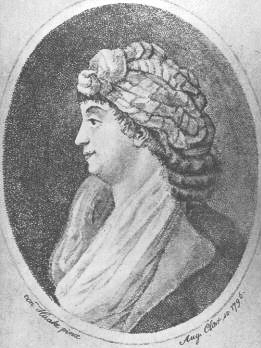Josepha Duschek facts for kids
Josepha Duschek (born Josepha Hambacher) (1754–1824) was an amazing singer, known as a soprano, during the Classical music era. She was a good friend of the famous composer Wolfgang Amadeus Mozart. Mozart even wrote some music especially for her to sing.
Her name is usually written in German as Josepha Duschek. In Czech, her name was Josefína Dušková.
Contents
Life of a Talented Singer
Josepha Hambacher was born in Prague on March 6, 1754. At that time, Prague was part of the Austrian Empire. She lived in Prague her whole life. Her father, Anton Adalbert Hambacher, was a successful apothecary (someone who prepared and sold medicines). Her mother, Maria Domenica Colomba, was from Salzburg.
When she was young, Josepha studied music with František Xaver Dušek. She married him on October 21, 1776. Her husband was already well-known internationally as a music teacher. They often hosted musical gatherings at their home, Villa Bertramka, where many famous people came to visit.
Josepha had a long and successful career as a singer. She performed concerts in many cities. These included Prague, Vienna, Salzburg, Dresden, Weimar, Leipzig, Warsaw, and Berlin.
Josepha and her husband were also close friends with the composer Ludwig van Beethoven. When Beethoven was in Prague in 1796, he wrote a special song called Ah! perfido for her. Josepha couldn't sing it at its first performance, but she did perform it later in Prague and Leipzig.
Duschek never worked for one specific opera house or company. She always chose to be a freelance singer, performing where she wanted.
After her husband passed away in 1799, she stopped performing in public. She sold her home, Bertramka, and lived in smaller places in Prague. By the time she died in 1824, she had very little money. She is buried at the Malostranský Cemetery in Prague.
Duschek and Mozart's Friendship
Duschek first met Mozart in 1777 when she visited Salzburg. Her mother was from Salzburg, and she had relatives there. During this visit, Mozart wrote a special song for her called "Ah, lo previdi," K. 272.
Mozart played music for her at a private concert in Vienna in 1786. This was shortly after his opera The Marriage of Figaro became very popular.
In 1787, The Marriage of Figaro was performed in Prague. Many music lovers from Prague invited Mozart to come and hear the show. It is thought that Duschek and her husband František were among those who invited him.
Later that year, Mozart returned to Prague. He came to finish and then perform his next opera, Don Giovanni. During this time, he stayed with the Duscheks at their summer house, Villa Bertramka. Mozart might have also stayed there in September 1791 while finishing his opera La clemenza di Tito.
A Fun Story About a Song
During his 1787 visit, Mozart wrote the concert song "Bella mia fiamma, addio," K. 528. This song was written in a fun way. Mozart's son, Karl Thomas, told this story:
The Villa Bertramka was a favorite place for Mozart to stay with his friends, the Duscheks. While there, he wrote parts of his opera Don Giovanni. One day, near the villa, there was a small building on top of a hill. Frau Duschek playfully locked Mozart inside it! She gave him ink, a pen, and paper. She told him he couldn't leave until he wrote the song he had promised her, using the words bella mia fiamma addio.
Mozart agreed to the challenge. But to get back at Frau Duschek for her trick, he put some very difficult parts in the song. He warned her that he would destroy the song if she couldn't sing it perfectly the first time she tried!
It seems Josepha Duschek was able to sing the difficult parts. Mozart's original music sheet for the song has her name written on it in his own handwriting.
In 1789, Duschek sang this song and other pieces at concerts Mozart gave in Dresden and Leipzig. This was during his trip through Germany that year.
What People Thought of Her Singing
Josepha Duschek's voice was highly praised. People admired how wide its range was and how flexible she could make it. Her fans even called her "a Bohemian Gabrielli," comparing her to the famous Italian singer Caterina Gabrielli.
The Grove Dictionary, a well-known music reference, described her singing. It said she was valued for the rich sound, range, and flexibility of her voice. She was also praised for her musical skill and her excellent way of performing both showy songs and spoken parts in music.
 | John T. Biggers |
 | Thomas Blackshear |
 | Mark Bradford |
 | Beverly Buchanan |


